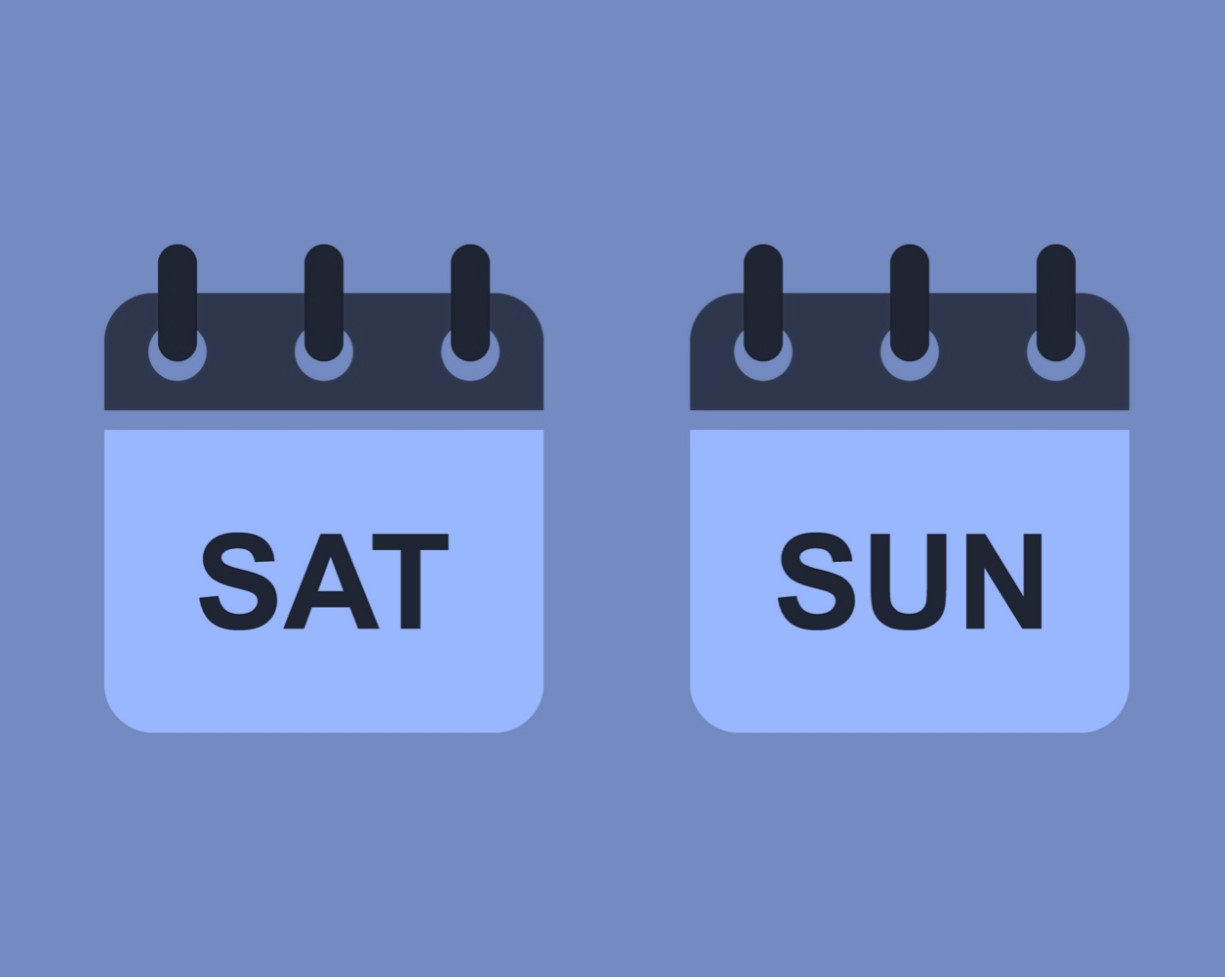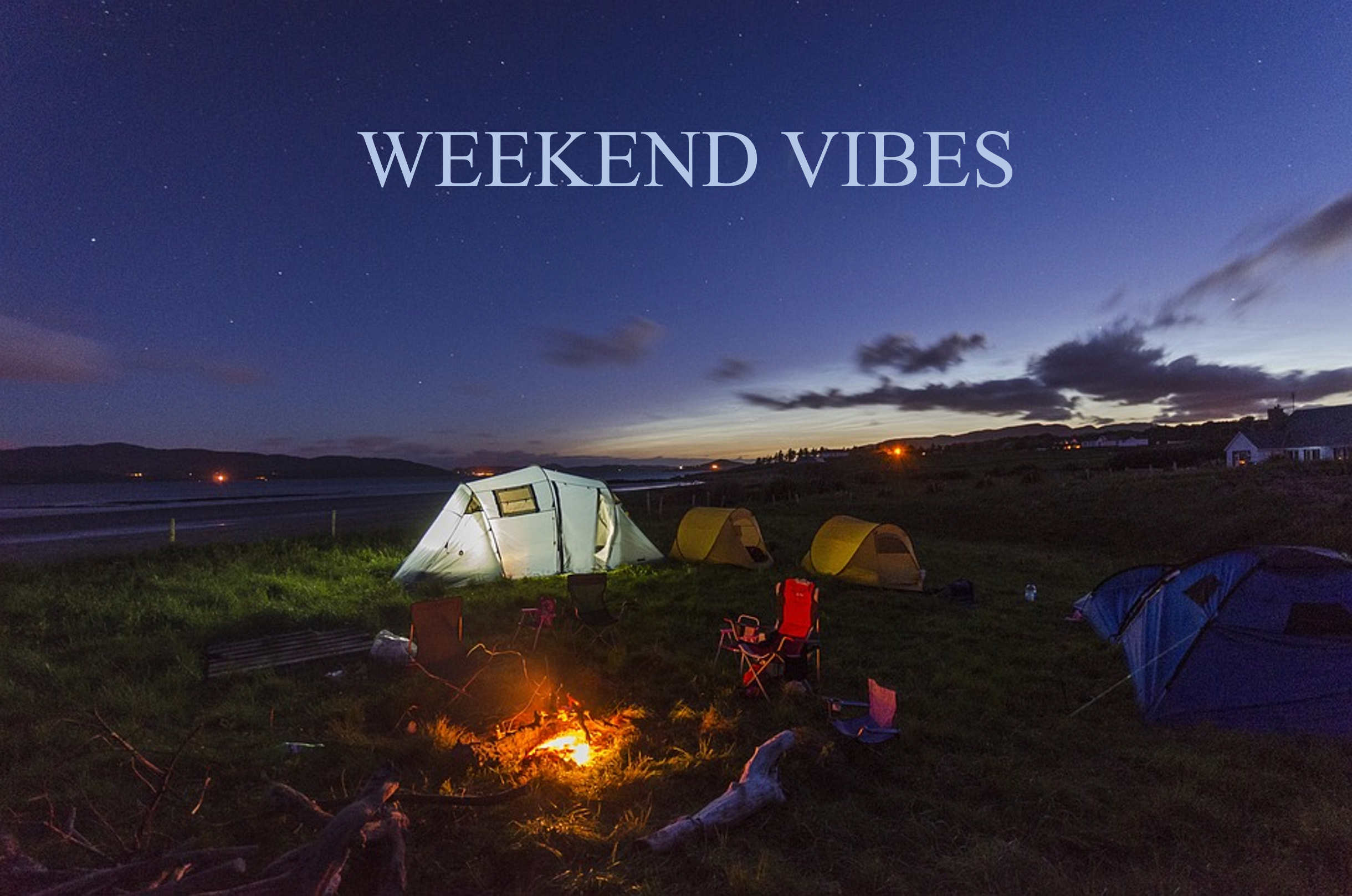
Loverboy had it right. We’re all workin’ for the weekend, and for most of us, that means Saturday and Sunday are days off. But now our post-COVID workplace protocols are changing the fabric of the typical Monday-Friday routine. Weekends have never been elevated to more importance. For many, they’re the “life” in the so-called “work-life balance.”
There’s also much talk about the 4-day workweek. And companies like Kickstarter are now experimenting with this truncated schedule. They’ve hooked up with dozen of other companies in a trial to test this concept.
According to CBS News, researchers at Boston College are spearheading the project, trying to determine whether a 32-hour workweek – Monday through Thursday – can be as efficient and productive as the standard 40 hours.
The early reviews are….not surprisingly….very good. In some workplaces, Fridays have morphed into half days – or less – anyway. They’ve always been more casual; now they’re becoming less productive as many employees sneak out or shut down early.
In radio, weekend programming has changed quite a bit in recent years, too. Pre-PPM, many stations leaned on syndicated programming, especially Sunday and often Saturday, too. And when it came to voicetracking, weekends quickly followed overnights in their lack of weight and import. More and more, stations are looking at Monday-through-Friday when pulling up the ratings. And special programming, theme weekends, and contesting on Saturdays and Sundays have become rarer over time. I’ve heard more than a few sales managers say they can’t sell weekends anyway. That’s how quarter-hours, hours, and entire days become “throwaways.”
And wouldn’t you know it – many stations find themselves dealing with declining weekend ratings, raising the chicken : egg question:
Are consumers listening less over the weekend due to their changing lifestyles OR are is it due to less compelling programming on the two “S days” on so many radio stations?
Radio is like every other entertainment and information medium. If we don’t make our programming sound big and of great value, our audiences won’t either. And when radio starts “mailing in” weekends, there’s simply less motivation for listeners to include radio in their Saturday and Sunday entertainment plans.
I subscribe to the print editions of the New York Times Saturday and Sunday editions. That gets me access to the digital editions throughout the week, but I truthfully enjoy having a physical newspaper on my weekends. And I started noticing that on Friday afternoons, the Times sends me a teaser/preview email without fail.
The email tees up three stories from the Sunday edition in a package simply called “This Weekend In Print.” It’s in the Cheltenham font the Times uses for its headlines. And it’s followed by capsule summaries of a trio of stories, along with the same illustrations that will appear in the Sunday edition.
headlines. And it’s followed by capsule summaries of a trio of stories, along with the same illustrations that will appear in the Sunday edition.
The subtitle is “A standout selection of articles brought to life in your paper.”
The Friday that caught my attention was September 26, and the email highlighted some of the bigger stories from the Sunday paper. On this day, they showcased the following;
- A title feature in their Sunday magazine. “The Voyages Issues,” featuring rare animal photography from around the world.
- Promotion for the Times’ highly popular “Cooking” special section, one of the paper’s most popular verticals, along with “Games.”
- A special print-only section, “The New York Times For Kids,” now a regular feature.
Animal photos, food, and kids – hard to go too wrong there.
 The Times’ choices seemed strategic, and the first two were available online, right now – two days before paper arrives on my front porch. The “Cooking” feature was “Dinner in Seven Ingredients (Or Even Fewer!)” – perfect for people on the go. In other words, most of us.
The Times’ choices seemed strategic, and the first two were available online, right now – two days before paper arrives on my front porch. The “Cooking” feature was “Dinner in Seven Ingredients (Or Even Fewer!)” – perfect for people on the go. In other words, most of us.
I checked subsequent Friday emails from the Times, and learned they vary greatly from week to week, ostensibly featuring what the editors consider their best work for that weekend. You have to wonder if there’s even an internal competition from editors to lobby their section’s best work for the “weekend preview” email.
(It makes you wonder why after decades of me subscribing, they don’t know me better. Like radio, the Times has no idea which parts of the paper I always/never read. For a print newspaper or radio airwaves, there’s no digital footprint.
But there could be. Not that every Friday email sent to Fred Jacobs should point to stories about entertainment, technology, business, and sports – but it would probably guarantee me being more attracted to that weekend’s paper.
Their email is always in 3’s, an acknowledgment our attention spans are limited. So many weekend emails I receive from radio stations are “laundry lists” of  promotions, sales tie-ins, and other on-air programming that the best stuff is often drowned out by the mass of everything else.
promotions, sales tie-ins, and other on-air programming that the best stuff is often drowned out by the mass of everything else.
And the obvious implication is that if I continue to find the weekend editions compelling, it will lead to me coming back Monday morning to start the new week.
For radio stations, that’s a big part of the weekend’s potential. It can showcase programming you won’t hear throughout the week, and it’s an obvious lead-in to the new week.
So, a few takeaways:
- Lean into your weekends. Make ’em sound big, important, worth listening to, and a place listeners can hear something different from the usual.
- Promote them with energy. Use your email database, and your air to make them stand out. If it’s really something big, use the push messaging function in your mobile app.
- Think in 3’s. On-air promos should be focused on one main feature, but the email should target three reasons to tune in Saturday/Sunday.
- Think weekend lifestyle. All weekends aren’t the same. In your market, this weekend could point to the big football rivalry, the color change, the coming Halloween extravaganza or whatever locals in your town are fixated on.
- Showcase your accessibility. If your listeners are likely on the road of going to be big game, remind them they can take the station with them via your app. Or remind them to bring Alexa along on those weekend getaways.
- Demand more from your voicetrackers – Don’t treat Saturday and Sunday as secondary listening periods. Raise the bar on your expectations. Weekend may be a great place for up-and-coming talent to get better, but demand more prep out of those weekend voices.
- Make sure your frontliners are there, too. If you can make it happen, use voicetracking to guarantee your main weekday talent are present on Saturday and Sunday, too.
- Cut weekends-only production. Weekend lifestyles bear little resemblance to Monday through Friday routines. Your station should sound like itself, of course, but have a different vibe.
Commit to making your weekends shine for a rating book, and then measure and evaluate. The ratings are one obvious way to do that. But so is a simple web survey of weekend features and themes among your email database members.
If you start seeing results, put together packages with your smartest, most motivated salesperson – someone who might actually listen to the station over the weekend. When one industrious person starts making regular sales using weekend inventory, that good news will make its way through the cubicles. Let’s not forget Saturday is the biggest shopping day of the week.
weekend. When one industrious person starts making regular sales using weekend inventory, that good news will make its way through the cubicles. Let’s not forget Saturday is the biggest shopping day of the week.
“Project Weekend” doesn’t have to be a giant time suck or a burden, but it should send a clear message to the staff that you’re not giving up on nearly 30% of the week’s 6a-midnight quarter-hours.
The more you reflect that weekend vibe, the more you have a chance to connect with your audience during their precious weekends. It’s another way of “meeting the audience where they are” – on their cherished Saturday and Sunday. Unlike the Times which has only touch points with a reader – when the email is opened (if it is) and when the reader picks up the physical paper or goes online, your radio station is in real-time whenever a listener punches you up or accesses the station via the stream.
Giving up on weekends also puts more pressure on that morning show of yours to have to start building an audience from scratch on those dreaded Monday mornings.
And whatever you do, have a nice weekend.
- What To Do If Your Radio Station Goes Through A Midlife Crisis - April 25, 2025
- A 2020 Lesson?It Could All Be Gone In A Flash - April 24, 2025
- How AI Can Give Radio Personalities More…PERSONALITY - April 23, 2025




I always thought a cool opportunity for someone on the staff who had programming aspirations was to appoint a “Weekend PD”. Someone who managed content (along with the station PD of course) solely on Saturday and Sunday. It would be a farm system of sorts to groom up and coming programmers providing your station with a unique weekend brand.
I’d consider borrowing a concept from (most notably) British newspapers: having weekend editions that are officially produced separately from the weekday ones. The most-obvious example is that the Observer is technically the Sunday counterpart of the Guardian; however, most of the other major papers also still have officially separate Sunday editions.
Weekends programming sucks because stations *have* to give the weekday staff a break. That’s a symptom of the bigger-picture problem of a lack of staffing due to budget cuts in the programming department, rather than a lack of effort and imagination.
Do you want to voicetrack four shifts (for free) on Friday afternoon after putting in 60 hours for a 40-hour-a week paycheck? No one does, and they’re going to get through it as quickly as possible. That leaves a programmer with no good options: burned out airstaff bitter about VTing weekend shifts (for free), or turning your station over to generic weekend time-filler. Country stations don’t carry both major countdown shows out of the generosity of their hearts. They do it because that is 6 hours of weekend day parts to fill.
Also, listeners notice when jocks are working seven days a week, and they don’t look at it in a positive way. They either assume the shift is pre-recorded (a bad impression) or they think their boss works them too hard (a worse and also correct impression).
Like all of radio’s current woes, this weekend programming problem was self-inflicted by the failing business model known as “corporate radio.”
Nailed it.
People used to break into the biz this way. Not anymore. There is budget, streamlined execution and syndication that sadly replaces quality content. Take our station we ran best of’s before taking on VSIN in the FB season. It’s hard to find a company unless you are in a top 10, or with a private owned company that still does this. We all agree weekends are great but unless you are a music station it’s hard. As a Hot Talk station there’s a bit of smoke and mirrors until this biz can afford to hire the next generation. Thing is how we all got our breaks isn’t happening today, so how does one break in? Weekends used to turn into overnights then nights and so on up to Mornings. That progression in all the big companies is not the same sadly! I wish it was because I don’t see the 20 somethings even on the radio really… they podcast or go elsewhere… we need new blood
Hard to disagree here, fellas. By mailing in nights, overnights, and weekends, the industry has strangled any chance at developing farm teams. It is a vicious cycle.
What? I have to actually WORK? When you stop and think of it, a weekend only occurs 52 times a year. Include Holidays and you find it occurs less than that. I can recall many a Friday afternoon struggling to find music to fit our “weekend theme” and then realizing that I bought into a 24/7 medium and snapped back to it. My first job was spinning 2 and half minute songs for 9 hours on a Sunday afternoon -and talking between each, reading 2 newscasts an hour and enjoying every second of it. (Oh there was a 30 minute religious program in the middle of it-some kinda break, right?). If anyone in 2022 believes that radio’s a 9 to 5 job, they might as well head on over to Wal-Mart and sign up. As bad as things can get in the business today, it’s still better than stocking shelves for many of us. That’s why we still do it.
Dave,
I love the theme of your post, the goal behind it. But the reality of the cost of living challenges many to rethink. Radio seemed to be something magical to many of us, but in truth there are many other ways now to connect, be creative and be culturally relevant. And stocking shelves looks mighty fine at over $20 an hour vs. corporate radio.
The point goes to Tai. (Good response.)
Indeed it is, Dave. Thanks for this.
As someone who, like you, Dave, got into the business before computers were standard control room equipment–i.e., when if a station was on the air, it was because a live person was sitting at the controls–I have to agree with you. But, like Tai, as someone who recognizes radio isn’t seen as “magical” as it once was, let alone able to compete with Walmart and fast-food salaries for most people in it, I have to agree with him as well. But for those of us who were there, yes, you could work long shifts while “enjoying every second of it.” And in fact, Christmas Day of my first year in radio I was working part-time at one station and full-time at another. That was a long day–but as “the new guy,” of course I “had” to work the holiday. But all these years later I still recall it as one of the best, happiest days of my life–doing what I loved all day, followed by spending time with people I loved all evening. That was one Merry Christmas.
Wow. You read my mind. I’ve been thinking a lot about this lately. In the pre-automation era there was a ton of energy put into weekends. In the present era anything that can be trimmed or cut has been. These things will drive listeners away in an already fierce competition for the ear.
Glad it resonated for you, Brian. Thanks for the comment.
There are many reasons to add weekend programing to every sales piece that is presented. Official sponsorship opportunities have enhanced value propositions and can be pitched as SPECIAL BRANDING OPPORTUNITIES. Prospective clients should be made aware of the relaxed mindset of the listener as a potential customer. There is a reason that stations use weekend inventory to sell their promotions and features, as listeners are more inclined to accept suggestion to try different features. An open mind is where adventure lives!
I miss you, Buzz…and those days when sales understood programming, and vice-verssa.
Who remembers when Saturday midday was sold out and often overfilled as your most listened to weekend day part? This, like the rest of radio, has changed for many reasons. Some mentioned in the blog (lack of or less effort) and also reasons listed in the comments. But one factor that always seems to be overlooked is the changing listener. Pivoting a little, I’ve had the opportunity over last the few days to watch some station’s morning shows on TikTok live. Granted these were either small or medium markets just running the camera live during a show. But in EVERY case as I sat waiting for the song to end to see what the jock was going to say, I was ultimately disappointed. Most are formatted like it’s 30-40 years ago. Think of the oft cited “weenie and the butt”. Same time checks, tired bits, over the top imaging…you get the idea. Same with the weekends. Do listeners really want any of the tired classic rock theme weekends? Or an AC’s feeble “I love the 80’s” (when they can get all 80’s all the time on any music app) or throwbacks on country when it’s the same 9 song category that you feature all week simply played one more time per hour? I am a bit intrigued by the growing list of large and medium market FM music stations running NFL football or college football on weekends either for sales or for a shot in the arm. What happens when the team is dreadful (looking at you Charlotte and DC). I do like the framework of what The NY Times does with the email and packaging. But to make it work – radio would have to step up the effort level more than it seems capable of…
Steve, I know several people agree with you – for radio, the ship has sailed. And maybe it has.
People still want to be entertained. I am still hopeful some radio stations will figure it out. Thanks for the comment.
Most radio stations have a brand name that is well known in their transmitter area. A strong brand that stands for something.
Imagine capitalizing on that brand. Fred – people such as yourself or if I may – myself know what to do. Will they call us?
david marsden
Yeah. I went back and read my post again. And it is a bit gloomy and jaded. So, what I should have added is that radio needs real reinvention. And it will probably be forward looking not back. The industry is somewhat analogous to the auto industry, which only a very few years ago probably wasn’t thinking of sunsetting ICE power, sedans and their 100 year old sales model. They’re figuring their way through Tesla and COVID, radio should be able to figure it’s way through the IPhone and COVID. And yes I do listen to the occasional block party weekend…
Thanks for popping back in, Steve, and thanks for reading our blog.
I spent almost all of my radio DJ life doing SIX live shows a week. My biggest nights were Friday & Saturday. Parties! Chatter! Music! Plus doing nothing means listening longer and listening with additional joy. And really listening and hearing.
Ratings were some of the highest of the week. But radio gave up. Why? No creativity allowed. Budget cuts and more.
Now I do my Friday and Saturday evenings doing the same kind of Free Form creative radio. BUT – I do it on line. That’s where the listeners are. Again some of the biggest numbers of the week. And on Sunday we present a line-up of DJ shows from the past week. Bingo!
Very few people in the under 35 demographic even have a radio except in the car and even that is rapidly disappearing.
I do my shows at NYthespirit.com. A worldwide experience. And as each week passes new music lovers are arriving daily. The word is out. Radio seems to have refused to think in a modern way. And the former listeners have picked up on that.
They are flooding to the online presentation. NOT a Spotify model!
That is just a jukebox (hopefully you remember those 🙂 )
This is ultra modern radio living in the now in the future. david marsden NYthespirit.com
David, great to hear from you on this post. Glad to hear things are going well on your new venture. I encourage our readers to check it out.
Thank you for writing about this. As a listener I’m sad to see radio as a medium that needs some help. I started out like a lot of folks doing a part-time weekend shift. I remember a PD telling me that a lot of folks “surf” on the weekend and I was important to the sound. Did this a few times and didn’t think of it as a job. It saddens me as a listener to hear the voicetracker say something like “so and so is starting their residency in Vegas next week…” when I used to hear that they were coming to my town. It really jumped out when Rewound Radio did their WLS-WCFL weekend a while back. Then I was a traffic manager for a while (and a salesperson asked one time me what the format was of the FM station……seriously).
Speaking of weekends….the big 50,000 watt clear channel AM here in the center of the midwest is airing 2 out of market NFL games this Sunday. That’s genius programming. I”m sure the entire market is going to turn off the TV to listen to it. (sarcasm intentional).
Thanks for this, Jerry.
And if there’s any upside to that AM giant carrying two out of market games, the good news is that neither game will feature my Detroit Lions. They have a “bye week.”